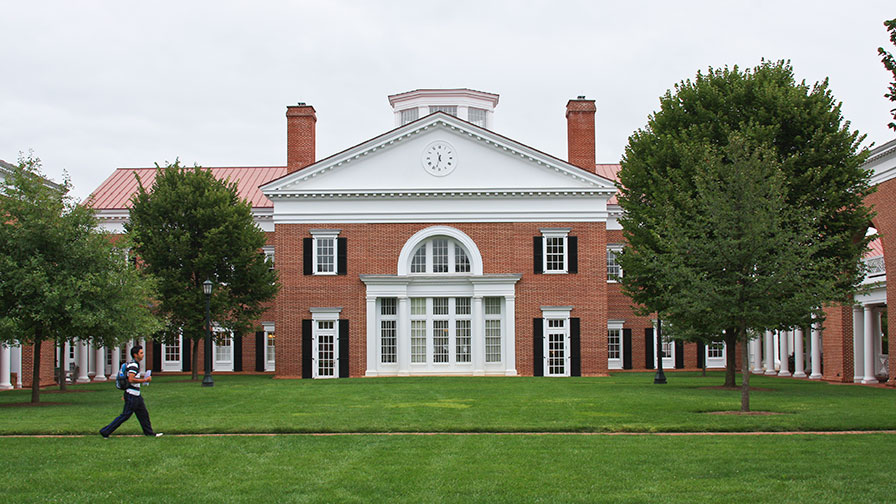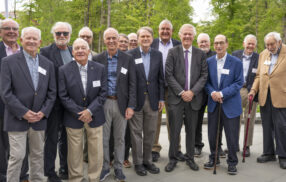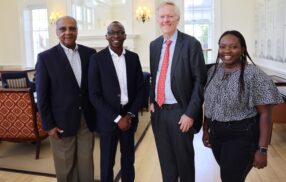
Leveraging Difference in Honor of Martin Luther King
Be courageous, build relationships and embrace the messiness are a few of the thoughts shared by students, faculty, staff and guests during a luncheon held at the University of Virginia Darden School of Business in honor of Dr. Martin Luther King Jr. On Tuesday, 24 January, “The Future of Diversity: A Conversation on Education, Business and Difference” featured a panel of speakers from the UVA community and several other universities as part of a two week celebration of King.
The panel’s moderator, Darden Professor Martin N. Davidson, opened the discussion with themes from his new book The End of Diversity as We Know It: Why Diversity Efforts Fail And How Leveraging Difference Can Succeed. In the early 1990s, there was a positive shift in enthusiasm for diversity, he said. Excitement behind diversity efforts existed across many institutions, including workplace environments.
Then, something happened.
“A senior company leader asked me, ‘So what? Why should I put so much energy into that when I should just be getting good talent?’ It was an interesting question. I thought part of what he was really asking was why we should explore diversity above and beyond social justice?” said Davidson. “Organizations needed a re-start. They made progress in diversity, but they couldn’t sustain it.”
In other words, companies were hiring a diverse range of individuals but could not retain them. After setting the stage for discussion, Davidson invited the panel members to share their backgrounds and ideas on diversity efforts. The conversation quickened.
UVA Professor Paul T. Harper explained that relationship building and creating diverse sets of friendships is a starting point. He discussed how sometimes the biggest goals start with the simplest of gestures.
According to Karen L. Proudford, Ph.D., associate professor of management at Morgan State University Earl Graves School of Business, those in the majority should consider their positions of privilege relative to others who may face challenges.
“It was a blind spot for me not to recognize what it means to be a part of the majority,” said Proudford, who recalled a time when she gave advice to a new white colleague who was concerned that students at their historically black institution were not connecting with him because of his skin color. Proudford, who is black, initially told her colleague it was because he was new and relationships would take time. Later, she acknowledged her misstep. “I went back to him and I said, ‘I cannot believe I said that to you. It was such a disservice to your experience.’”
Dr. Marcus L. Martin, vice president and chief officer for diversity and equity at UVA and former chief of emergency medicine at UVA Health System, pointed to his experience in medicine that helped him gain an understanding of people from all walks of life.
Davidson asked if we still live in a time when we have to argue the merits of diversity.
“People don’t necessarily agree that there’s a benefit to diversity,” replied Terri Harris Reed, vice provost for diversity and inclusion at The George Washington University. “This is the kind of push back I get — that it’s studied in a particular sort of way to get a particular set of outcomes. We get a good outcome even if there isn’t diversity. So you can argue that it’s a better outcome, but there’s nothing wrong with the outcome that we have.”
Audience members shared their experiences as well. One consultant discussed the challenges of working with companies who were more committed to a particular type of corporate culture than to diversity in hiring.
“We worked with a startup company that wanted to be that Silicon Valley, cool, creative workplace. Almost everyone was young and white,” he said. “The HR folks were afraid that they were opening themselves up to lawsuits, lack of innovation and diversity in decision making, but the leadership wasn’t buying it because the cool, corporate culture was more important than anything else.”
Tuesday’s event is one of many presentations happening across UVA Grounds to commemorate King’s life. Davidson also held a workshop for University leaders earlier in the day that addressed themes from his book — sparking more conversations that reflect a commitment to progress through diversity of ideas, experiences and people.
The University of Virginia Darden School of Business prepares responsible global leaders through unparalleled transformational learning experiences. Darden’s graduate degree programs (MBA, MSBA and Ph.D.) and Executive Education & Lifelong Learning programs offered by the Darden School Foundation set the stage for a lifetime of career advancement and impact. Darden’s top-ranked faculty, renowned for teaching excellence, inspires and shapes modern business leadership worldwide through research, thought leadership and business publishing. Darden has Grounds in Charlottesville, Virginia, and the Washington, D.C., area and a global community that includes 18,000 alumni in 90 countries. Darden was established in 1955 at the University of Virginia, a top public university founded by Thomas Jefferson in 1819 in Charlottesville, Virginia.
Press Contact
Molly Mitchell
Associate Director of Content Marketing and Social Media
Darden School of Business
University of Virginia
MitchellM@darden.virginia.edu





